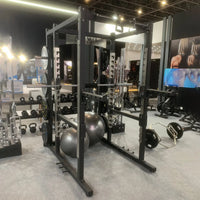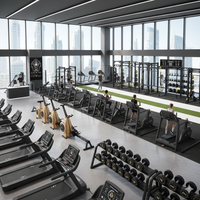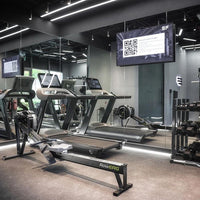
Strength training is a cornerstone of fitness, and the choice between barbells and dumbbells often sparks debate among gym enthusiasts. Both tools are highly effective for building muscle, increasing strength, and improving endurance, but each has unique advantages depending on your goals, experience level, and workout preferences. This guide breaks down the benefits of barbells and dumbbells, helping you decide which is better suited for your strength training needs.
The Case for Barbells
Barbells consist of a long bar that can hold varying weights on either end, making them ideal for lifting heavy loads and performing compound exercises.
Advantages of Barbells
-
Lift Heavier Weights:
Barbells allow for heavier lifts compared to dumbbells, as they distribute the load evenly and require less stabilization. This makes them perfect for building maximal strength.- Example: Exercises like the deadlift or squat are best performed with a barbell, allowing lifters to safely handle heavy weights.
-
Efficient Progression:
Adding small weight increments (e.g., 2.5 kg plates) to a barbell makes it easier to gradually increase resistance, a key factor for progressive overload. -
Ideal for Compound Movements:
Barbells excel at compound exercises, which target multiple muscle groups simultaneously.- Example Exercises: Squats, bench presses, deadlifts, and overhead presses.
-
More Control in Powerlifting:
For exercises requiring explosive power, such as cleans and snatches, barbells provide better control and balance.
Limitations of Barbells
- Less Range of Motion: The fixed bar limits natural movement patterns, potentially increasing joint stress during certain exercises.
- Stabilizing Muscles Work Less: Barbells engage fewer stabilizing muscles compared to dumbbells.
- Requires Equipment: Barbell training often requires additional equipment like a power rack or bench, making it less accessible for home gyms with limited space.
The Case for Dumbbells
Dumbbells are free weights designed to be held in one hand, offering more versatility and range of motion.
Advantages of Dumbbells
-
Greater Range of Motion:
Dumbbells allow for natural movement patterns, reducing joint stress and promoting better muscle engagement.- Example: A dumbbell bench press enables a deeper stretch in the chest compared to a barbell press.
-
Improved Muscle Symmetry:
Dumbbells require each arm to work independently, addressing muscle imbalances and promoting equal strength development. -
Versatility:
Dumbbells can be used for a wide variety of exercises, from isolation movements like bicep curls to full-body exercises like renegade rows. -
Engages Stabilizing Muscles:
Because dumbbells are less stable than barbells, they force stabilizing muscles to work harder, improving balance and coordination. -
Ideal for Home Gyms:
Compact and easy to store, dumbbells are perfect for those with limited space in their home gym.
Limitations of Dumbbells
- Limited Max Load: Dumbbells are less suited for heavy lifting since they can be difficult to handle with maximal weights.
- Less Suitable for Powerlifting: Exercises like deadlifts or squats are more challenging to perform with heavy dumbbells due to balance and grip limitations.
- Slower Progression: Incremental weight increases are often larger with dumbbells, making fine-tuning more difficult.
Barbells vs. Dumbbells: Head-to-Head Comparison
| Feature | Barbells | Dumbbells |
|---|---|---|
| Best for | Maximal strength, compound lifts | Versatility, muscle symmetry, balance |
| Load Capacity | Can handle heavier weights | Limited to manageable weights |
| Range of Motion | Fixed, less natural | Greater, natural movements |
| Muscle Activation | Focus on prime movers | More stabilizing muscles engaged |
| Progression | Smaller weight increments possible | Larger weight jumps |
| Space Requirement | Requires racks/benches | Compact, ideal for home gyms |
Which Should You Choose?
The choice between barbells and dumbbells depends on your fitness goals, training environment, and personal preferences.
Choose Barbells If You Want To:
- Focus on maximal strength and power.
- Perform heavy compound lifts like squats, deadlifts, or bench presses.
- Train for powerlifting or Olympic lifting.
- Use progressive overload with small, consistent weight increases.
Choose Dumbbells If You Want To:
- Improve muscle balance and symmetry.
- Perform isolation exercises or movements requiring a greater range of motion.
- Work on stability, coordination, and functional strength.
- Train in a small space or create a versatile home gym.
The Best of Both Worlds
For well-rounded strength training, incorporating both barbells and dumbbells into your routine is ideal. Use barbells for heavy compound lifts to build overall strength, and dumbbells for accessory work and isolation exercises to fine-tune muscle groups and address imbalances.
-
Example Hybrid Routine:
- Barbell Squats (4 sets of 6 reps): Build lower-body strength.
- Dumbbell Bench Press (4 sets of 8-10 reps): Engage stabilizing muscles in the chest.
- Barbell Deadlifts (3 sets of 5 reps): Develop posterior chain strength.
- Dumbbell Lateral Raises (3 sets of 12-15 reps): Isolate and shape shoulders.
Choosing the Right Equipment in Dubai
For fitness enthusiasts in Dubai, investing in high-quality gym equipment is essential. Whether setting up a home gym or upgrading a professional facility, ensure you have durable and versatile barbells and dumbbells.
- Barbells: Opt for Olympic barbells with a smooth grip and durable build, perfect for heavy lifting.
- Dumbbells: Adjustable dumbbells are ideal for saving space while providing a wide range of weight options.
- Gym Essentials: Consider power racks, benches, and weight plates for a complete setup.
Final Thoughts
Barbells and dumbbells each play a unique role in strength training, offering complementary benefits that cater to different goals. By understanding their strengths and limitations, you can tailor your workouts to maximize muscle growth, improve strength, and achieve balance in your training.
For those in Dubai, access to the best gym equipment ensures you can create a versatile training environment, whether at home or in a commercial setting. Combine the power of barbells with the flexibility of dumbbells to unlock your full strength potential.




0 comments